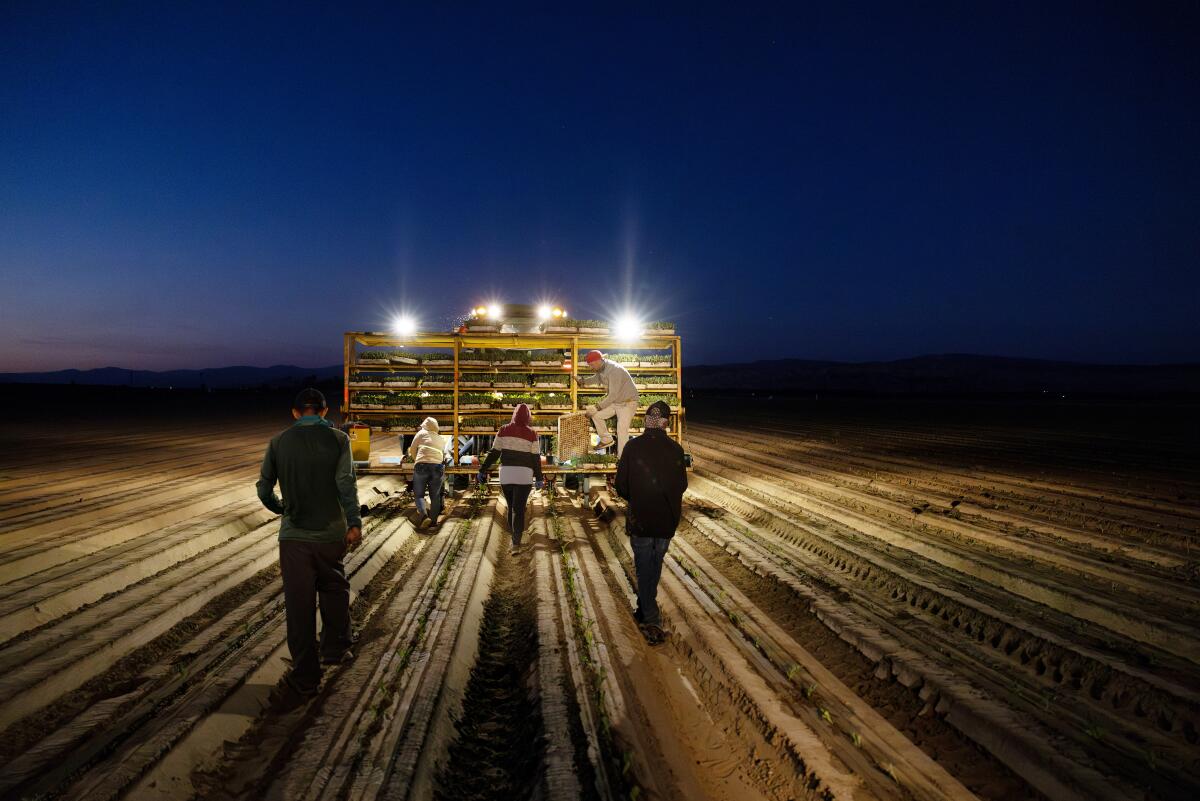After years resisting state law, Coronado settles a lawsuit to allow more affordable housing

- Share via
Good morning. It’s Monday, Oct. 23. Here’s what you need to know to start your day.
- After years resisting state law, Coronado settles a lawsuit to allow more affordable housing
- SAG-AFTRA’s Fran Drescher faces tough choices after 100 days of strike
- The best shopping, bowling and noodles in Koreatown
- And here’s today’s e-newspaper
Sign up for Essential California
The most important California stories and recommendations in your inbox every morning.
You may occasionally receive promotional content from the Los Angeles Times.
A housing crackdown for Coronado
To address its housing shortage, California has to (spoiler alert) build more housing. But despite an affordable housing law that directs all communities across the state to be part of the solution, some cities have actively resisted.
Perhaps the most flagrant violator, as Times reporter Liam Dillon wrote earlier this year, is Coronado. Leaders of the tied island town slightly offshore from San Diego “thumbed their noses at Gov. Gavin Newsom and state regulators,” Liam reported, and “[assured] residents that it will be years before the state cracks down.”
Now that crackdown has arrived. The city reached a legal settlement with the state Friday, which will allow more than 900 homes to be built within the city. As part of the agreement, more than 70% of those would be available to low- and moderate-income families.
Under the settlement, Coronado has until mid-April to adopt a state-approved housing plan and must complete its rezoning process by early May. The state law doesn’t require cities to build or approve new housing, but it does require local governments to make more land available for housing development.
If city leaders don’t meet those requirements, the city could lose some local control over development decisions and face fines, Liam reported.
In a news release, Atty. Gen. Rob Bonta said the decision was a long time coming. “The housing crisis we are facing in California is enormous,” he said, “and the only way we can tackle it is if every local government follows the law and builds its fair share of housing.”
Roughly 21,000 people live in Coronado, though the figure fluctuates due to the U.S. Navy facilities that cover more than half the land. Census data show that more than a quarter of homes in the city are vacant — most of those are listed for seasonal or recreational use — and the median home value exceeds $2 million, according to Zillow.
Coronado isn’t the only city resisting efforts to increase housing, nor the only one that state leaders have launched legal battles against.
Bonta’s office filed a lawsuit against Huntington Beach back in March, after its City Council failed to pass a rezoning plan to increase housing, violating state law. That follows a previous lawsuit settled in 2020 over the city’s years of failure to comply with affordable housing rules.
The state also sued the Sacramento County city of Elk Grove in May, alleging that officials there violated state law and discriminated against low-income families by denying a homeless housing project.
And those are just a few, as Liam noted:
“Statewide, 78 communities — roughly a quarter of those with plans already due in the current eight-year period — are currently out of compliance, according to data from the California Department of Housing and Community Development.”
Today’s top stories

Actor’s strike
- Fran Drescher is SAG-AFTRA’s “Norma Rae,” but her position has become an increasingly difficult one as the strike hits 100 days.
- SAG-AFTRA and the alliance representing major studios said they would resume negotiations on Tuesday, the first formal talks since discussions broke down Oct. 11.
- SAG-AFTRA says members’ kids can dress up as Barbie or a Super Mario Brother this Halloween, though the dispute over what constitutes promotion remains unsettled.
Business
- Scammers are exploiting Bitcoin ATMs. Will new California laws help crack down on fraud?
- At 10 a.m. Thursday, dozens of shoppers were already lined up outside the Forever 21 store at the Ontario Mills mall to shop Shein. It was part of a new strategy for the e-commerce giant: launch an offline pop-up inside one of its biggest rivals.
- As Rite Aid prepares to shutter 31 locations in California amid financial struggles, it’s not only local pharmacy counters that are at risk. The drugstore chain sells one of the region’s most iconic desserts with nearly a century of history and happy customers: Thrifty Ice Cream.
Environment
- For the second time in three years, a rare and otherworldly looking black anglerfish was found at Newport Beach’s Crystal Cove State Park, showing up on Friday the 13th with its gaping mouth, jagged, translucent teeth and spiny dorsal fin.
- A new law will expand a moratorium on rat poison, which wildlife advocates say is a win for mountain lions, coyotes and other animals that are often the unintended victims of the poison.
War in the Middle East
- ‘The left has really let us down.’ Why many American Jews feel abandoned.
- How big are Israel and Gaza? Smaller than you might think.
- Maha Dakhil, a top agent at CAA, steps aside from leadership roles after Israel-Hamas post.
More big stories
- What do more quakes at one of California’s riskiest volcanoes mean? Scientists think they know.
- Charles E. Young, UCLA’s longest-serving chancellor, dies at 91.
- Dynasty derailed: Inside the October issues keeping the Dodgers from another World Series.
- Los Angeles D.A. George Gascón is facing nine challengers in one of the largest primary fields in L.A. history. Here’s who is running.
- Aiming to bring Angelenos back to public transportation, Metro officials are aiming to make permanent so-called transit ambassadors, who have spent the last year riding trains and buses in bright green shirts to offer a helping hand.
- Cindy Montañez, a pioneering political and environmental leader on the San Fernando City Council, has died at 49. After serving in the California Assembly, Montañez brought hundreds of millions of dollars to the San Fernando Valley and other underserved communities to clean up polluted areas and beautify neighborhoods.
- A professional horse rider was killed Friday while training a filly at Cypress’ Los Alamitos Race Course.
Get unlimited access to the Los Angeles Times. Subscribe here.
Commentary and opinions
- Bill Plaschke: In a supposed breakthrough USC season, Lincoln Riley has been a bust.
- Doyle McManus: Biden says the U.S. must help Israel and Ukraine succeed — he’s staking his reputation on it.
- Mary McNamara: The Israel-Hamas war is horrific. And celebs posting on social media won’t solve it.
- Commentary: I tried to bury my mom in an environmentally responsible way in L.A. It was impossible.
- Tony Barboza: The fossil fuel industry wants you to think Latinos are against EVs. That’s not what I found.
- Opinion: How Sedona, an epicenter of spiritual energy and Arizona tourism mecca, came to fear and loathe tourists.
- Opinion: Where have all the pianos gone? No one has time for them anymore.
Today’s great reads

Dov Charney, Milo Yiannopoulos, Ye and the battle over a historic Silver Lake compound. There’s no question the Garbutt House is unusual and historic; what’s up for debate is to whom it belongs. The property is a key piece in the bankruptcy case of fashion entrepreneur Dov Charney, the controversial founder of American Apparel and Los Angeles Apparel. Charney could be booted from the property as soon as next month, but he’s not the only one who lives there — Charney appears to have several just as controversial housemates whose presence has complicated the case.
Other great reads
- Coachella Valley’s farmworkers are struggling after crops were heavily damaged by Tropical Storm Hilary.
How can we make this newsletter more useful? Send comments to essentialcalifornia@latimes.com.
For your downtime

Going out
- 🎳🍜 Our neighborhood guides are here to show you it all, like shopping, bowling and noodles in Koreatown.
- 🚶♂️🍷 Or the best spots to wine, dine and walk around Silver Lake.
- 🎤 How to have the best Sunday in L.A., according to Maria Bamford — who actually prefers a Monday Funday.
Staying in
- 📖 Review: Britney Spears’ memoir is a Gothic horror story.
- 📺 Catch up on “Saturday Night Live”: Bad Bunny pulled double duty with the help of Pedro Pascal and Mick Jagger.
- 🥣 It’s chili time and we have recipes for classic con carne and vegetarian versions too.
- ✏️ Get our free daily crossword puzzle, sudoku, word search and arcade games.
And finally ... a great photo
Show us your favorite place in California! Send us photos you have taken of spots in California that are special — natural or human-made — and tell us why they’re important to you.

Today’s great photo is from The Times’ Gina Ferazzi. More than two months ago, Tropical Storm Hilary hit the Coachella Valley, destroying crops and disrupting the lives of workers who tend to them. The local economy has been slow to recover as residents try to make up for lost time and money: “Essentially, you get one shot at harvest every single year,” date farmer Mark Tadros said. “This is one of those years where really, the goal is to hope to break even.”
Have a great day, from the Essential California team
Ryan Fonseca, reporter
Laura Blasey, assistant editor
Check our top stories, topics and the latest articles on latimes.com.
Sign up for Essential California
The most important California stories and recommendations in your inbox every morning.
You may occasionally receive promotional content from the Los Angeles Times.







